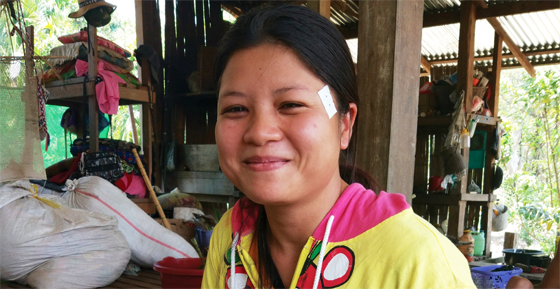|
Naw Poe lives with her husband and two-year-old son in Hsar Pwel Htar, a remote village in Myanmar’s Tanintharyi Region in the southeast of the country. The village has no health clinic. The nearest one is about two hours drive by motorbike across difficult terrain. During the monsoon season, the dirt tracks that connect villages are often impassable. The family’s combined income averages around $75 per month. This is just enough to cover day-to-day essentials but when a family member gets sick, they face potentially catastrophic health costs. “The nearest clinic is far away and it is expensive for us to go there,” explains Naw Poe. “We have to pay for transportation, food, medicine and accommodation. That is too much for our family so we have to go into debt. It is difficult to borrow money from other families in the village because no one has much here.”
Hsar Pwel Htar village is one of the hundreds in which CPI supports a Malaria Post, staffed by a community-based health worker trained by CPI in basic malaria prevention, diagnosis and treatment. This approach is a key part of CPI’s model to invest in community-based health care, particularly in remote and conflict-affected regions where communities have little or no access to other health care services. In mid-2016, Naw Poe fell ill with a fever, chills and severe headache. Aware that the health worker at the Malaria Post offered free malaria treatment, she went to see her immediately. “She tested my blood and told me that I had malaria,” Naw Poe explains. “She gave me some pills to take, white and brown, and told me to come back immediately if I felt any discomfort. About one week after I started taking the medicine, I felt much better.” “She also explained to me how you catch malaria and reminded me to make sure the family sleeps under the bed net every night so that the mosquitoes can’t bite us. We will definitely be more careful in the future.” “I don’t know what I would have done if she hadn’t been there,” Naw Poe explains. “It was the rainy season, so the track to the nearest clinic was in a bad condition and I probably couldn’t have made it. I could have died.” For Naw Poe, the new Malaria Post has made a difference. “I used to worry a lot about malaria, for my family and myself. It is better now – we can get advice and free treatment to help us stay healthy. It would be good to have more health services like this in our village. I hope things will continue to get better in the future. That way, when we get sick, we won’t need to travel long distances and spend a lot of money to get treatment.” Naw Poe is one of 2,360 people that tested positive for malaria and received treatment through CPI’s malaria elimination program in 2016. Comments are closed.
|
AuthorCPI Admin Archives
July 2024
Categories
All
|
|
|
COMMUNITY PARTNERS INTERNATIONAL
580 California St Fl 16, Ste 1658, San Francisco, CA 94104-1068, USA [email protected] +1 510 225 9676 We are a registered nonprofit 501(c)(3) Public Charity. TAX ID 94-3375666 |
©
Community Partners International


 RSS Feed
RSS Feed
